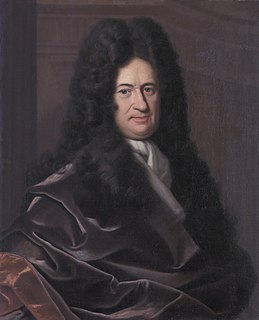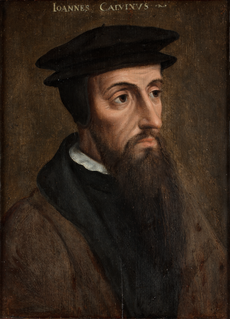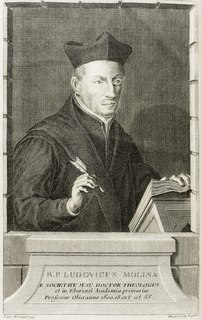Related Research Articles
Natural theology, once also termed physico-theology, is a type of theology that provides arguments for the existence of God based on reason and ordinary experience of nature.

Predestination, in Christian theology, is the doctrine that all events have been willed by God, usually with reference to the eventual fate of the individual soul. Explanations of predestination often seek to address the "paradox of free will", whereby God's omniscience seems incompatible with human free will. In this usage, predestination can be regarded as a form of religious determinism; and usually predeterminism, also known as theological determinism.

Theodicy means vindication of God. It is to answer the question of why a good God permits the manifestation of evil, thus resolving the issue of the problem of evil. Some theodicies also address the evidential problem of evil by attempting "to make the existence of an all-knowing, all-powerful and all-good or omnibenevolent God consistent with the existence of evil or suffering in the world." Unlike a defense, which tries to demonstrate that God's existence is logically possible in the light of evil, a theodicy attempts to provide a framework wherein God's existence is also plausible. The German philosopher and mathematician Gottfried Leibniz coined the term "theodicy" in 1710 in his work Théodicée, though various responses to the problem of evil had been previously proposed. The British philosopher John Hick traced the history of moral theodicy in his 1966 work, Evil and the God of Love, identifying three major traditions:
- the Plotinian theodicy, named after Plotinus
- the Augustinian theodicy, which Hick based on the writings of Augustine of Hippo
- the Irenaean theodicy, which Hick developed, based on the thinking of St. Irenaeus

Predestination is a doctrine in Calvinism dealing with the question of the control that God exercises over the world. In the words of the Westminster Confession of Faith, God "freely and unchangeably ordained whatsoever comes to pass." The second use of the word "predestination" applies this to the salvation, and refers to the belief that God appointed the eternal destiny of some to salvation by grace, while leaving the remainder to receive eternal damnation for all their sins, even their original sin. The former is called "unconditional election", and the latter "reprobation". In Calvinism, some people are predestined and effectually called in due time to faith by God.

William Foxwell Albright was an American archaeologist, biblical scholar, philologist, and expert on ceramics.

Open theism, also known as openness theology and free will theism, is a theological movement that has developed within Christianity as a rejection of the synthesis of Greek philosophy and Christian theology. Open theism is typically advanced as a biblically motivated and philosophically consistent theology of human and divine freedom, with an emphasis on what this means for the content of God's foreknowledge and exercise of God's power.

Biblical criticism is the use of critical analysis to understand and explain the Bible. During the eighteenth century, when it began as historical-biblical criticism, it was based on two distinguishing characteristics: (1) the scientific concern to avoid dogma and bias by applying a neutral, non-sectarian, reason-based judgment to the study of the Bible, and (2) the belief that the reconstruction of the historical events behind the texts, as well as the history of how the texts themselves developed, would lead to a correct understanding of the Bible. This set it apart from earlier, pre-critical methods; from the anti-critical methods of those who oppose criticism-based study; from later post-critical orientation, and from the many different types of criticism which biblical criticism transformed into in the late twentieth and early twenty-first centuries.

Molinism, named after 16th-century Spanish Jesuit theologian Luis de Molina, is a view about the providence of God in light of human free will. Prominent contemporary Molinists are William Lane Craig, Alfred Freddoso, Thomas Flint, Kenneth Keathley, Dave Armstrong, and Tim Stratton. The view affirms a strong notion of God's control of events in the world, alongside an equally firm view of human freedom.

The attributes of God are specific characteristics of God discussed in Christian theology. Christians are not monolithic in their understanding of God's attributes.

Sex occurs frequently in the Hebrew Bible. Some references are provide unambiguous ethical regulations, such as the laws given in Leviticus or Deuteronomy. Others are more ambivalent, most famously the potentially homosexual actions of Ham with his father, Noah. Its depictions of homosexuality, rape, prostitution and incest have spurred considerable academic and theological attention.

Christian ethics, also known as moral theology, is a multi-faceted ethical system: it is a virtue ethic which focuses on building moral character, and a deontological ethic which assesses choices. It also incorporates natural law ethics, which is built on the belief that it is the very nature of humans – created in the image of God and capable of morality, cooperation, rationality, discernment and so on – that informs how life should be lived, and that awareness of sin does not require special revelation. Other aspects of Christian ethics, represented by movements such as the social Gospel and liberation theology, may be combined into a fourth area sometimes called prophetic ethics.
Austin Marsden Farrer was an English Anglican philosopher, theologian, and biblical scholar. His activity in philosophy, theology, and spirituality led many to consider him one of the greatest figures of 20th-century Anglicanism. He served as Warden of Keble College, Oxford, from 1960 to 1968.
John E. Sanders is an American Christian theologian. He currently serves as professor of religious studies at Hendrix College. Sanders is best known for his promotion of open theism but he has also written on cognitive linguistics and religious pluralism (inclusivism).
The concept of God in Abrahamic religions is centred around the dedicated worship of a singular supreme deity. The three major monotheistic religions of Judaism, Christianity and Islam, alongside the Baháʼí Faith, Samaritanism, Yazidism, Druzism and Rastafarianism, are all regarded as Abrahamic religions due to their shared acceptance of the God that revealed himself to Abraham. Abrahamic religions share the same distinguishing features:
Christian feminism is a school of Christian theology which seeks to advance and understand the equality of men and women morally, socially, spiritually, and in leadership from a Christian perspective. Christian feminists argue that contributions by women, and an acknowledgment of women's value, are necessary for a complete understanding of Christianity. Christian feminists believe that God does not discriminate on the basis of biologically-determined characteristics such as sex and race, but created all humans to exist in harmony and equality, regardless of race or gender. Christian feminists generally advocate for anti-essentialism as a part of their belief system, acknowledging that gender identities do not mandate a certain set of personality traits. Their major issues include the ordination of women, biblical equality in marriage, recognition of equal spiritual and moral abilities, abortion rights, integration of gender neutral pronouns within readings of the Bible, and the search for a feminine or gender-transcendent divine. Christian feminists often draw on the teachings of other religions and ideologies in addition to biblical evidence, and other Christian based texts throughout history that advocate for women's rights.
Christian views on environmentalism vary among different Christians and Christian denominations.

T. Richard Rice is an American Seventh-day Adventist theologian and author. He is a leading proponent of "open theism". As of 2007 he is professor of theology and philosophy of religion at Loma Linda University in California.

Gary William Chartier is an American legal scholar and philosopher who is currently Distinguished Professor of Law and Business Ethics and Associate Dean of the Tom and Vi Zapara School of Business at La Sierra University in Riverside, California.

Christian theology is the theology of Christian belief and practice. Such study concentrates primarily upon the texts of the Old Testament and of the New Testament, as well as on Christian tradition. Christian theologians use biblical exegesis, rational analysis and argument. Theologians may undertake the study of Christian theology for a variety of reasons, such as in order to:
In the Tenrikyo religion, Tenrikyo anthropology is the study of humanity and its relationship to God in the context of Tenrikyo theology. This is not to be confused with the social science of anthropology.
References
- ↑ "Mark W Elliott". University of St Andrews. Retrieved 19 April 2020.
- ↑ "Mark W. ELLIOTT. The Heart of Biblical Theology". catholicbooksreview.org. Retrieved 19 April 2020.
- ↑ Wright, Terry J. (4 November 2014). "Mark W. Elliott". Theology. 117 (6): 444–445. doi:10.1177/0040571X14547470l.
- ↑ Carvalho, Corrine (April 2015). "Elliott, Mark W. . Burlington, VT, and Farnham, UK: Ashgate, 2012. 187 pp. £60.00 (cloth)". The Journal of Religion. 95 (2): 255–256. doi:10.1086/681676.
- ↑ Wright, Terry J (October 2017). "Providence Perceived: Divine Action from a Human Point of View. By Mark W. Elliott". The Journal of Theological Studies. 68 (2): 866–868. doi:10.1093/jts/flx136.